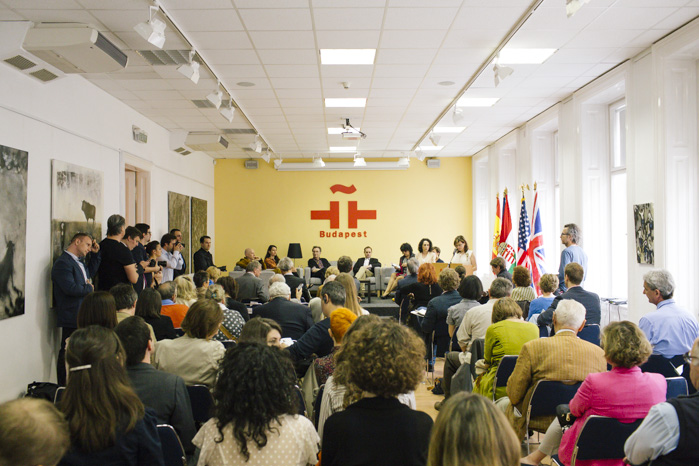As some may recall, I ran a TeleRead piece a while back pulling together a series of alarming reports that indicate that too many literary festivals are little more than money-grubbing scams. Now a certain pseudonymous literary agent, sailing under the monicker of Dolores Montenegro, has fished the debate back up again in the pages of the UK’s New Statesman, highlighting “The problem with literary festivals,” which is that “most have big money sponsors but fail to pay authors – splurging on comedians and celebrity politicians instead.”
I’m happy to add, as a Scot, that Montenegro also concludes that “Scottish festivals set the best example.” However, at the start, let me add that the problem is not necessarily with all festivals, or even a majority of them. Some really don’t have the money to pay anyone, for anything. But a significant and lucrative minority of name-brand franchises can pull down the big bucks – and those funds may go anywhere but towards the authors who provide their essential content and raison d’etre.
Montenegro instances the Times Cheltenham Literature Festival and the Hay Festival of Literature as particular offenders. The latter, as I can testify personally from volunteering at the Hay Festival Budapest, has mutated into a sprawling global brand of 14 events and counting, from Aarah to Xalapa.

At the Hay Festival Budapest, input from the parent Hay office was minimal, with only two emissaries on-site. On the other hand, volunteers got a free [easyazon-link asin=”1905131372″ locale=”us”]Blue Guide Hay-on-Wye (Blue Guides)[/easyazon-link], which surely could spark a few travel plans. Who knows, maybe the authors involved might have appreciated the price of even one of those guides as a token fee? After all, according to Montenegro, it will cost a publisher at least £150 ($240) for a typical London-to-Hay train fair plus an overnight stay for their author.
And yes, traditionally, an author’s publisher would foot the bill for their expenses. Typically, but not always. As British author Guy Walters detailed at length in his article on his Hay experience, authors are often pushed by their agents to appear at festivals, on public media, etc., without involving the publishers at all. And for self-published authors, of course, there is no one else to pick up the tab.

The UK’s Peter Florence is the whizz regarded as the Richard Branson of the Hay Festivals brand, which he reportedly launched with the winnings from a poker game. Ex-U.S. president Bill Clinton described the Hay Festival as the “Woodstock of the mind” – rumors repeated by Montenegro allege that Hay paid him £40,000 ($63,750) to turn up there in 2001. Remember that on the international speaker circuit, these kinds of figures are not charitable donations or campaign contributions: Speakers are being paid in cash for turning up, just as writers ought to be. Hay still rewards its authors with a few bottles of wine as their fee – one wonders did they give Clinton free cigars?
Other festivals go a tad further than free wine. As Montenegro remarks, “the Scottish ones … always pay a fee and accommodation. In fact of all the big festivals, it’s Edinburgh that gets it right more often than not with big authors subsidising little ones, impeccable care, a light sprinkling of celebrity but the emphasis very much on literature.” Not bad for proverbially canny, penny-pinching Scots.
And probably quite timely too. Because, as Walters insists: “It’s time we authors were paid, not in promises of better sales and high profiles, but in money. Yes, actual cash. Is that too much to ask?” Authors may not go on strike to enforce this, but certain well-financed literary festivals – like Hay and Cheltenham – will continue to suffer reputational damage until it happens, if Montenegro’s report is anything to go by.
































Most literary festivals I’m familiar with in the States tend to have area authors who pay their own way, and, maybe, one “name” author to bring in the crowds. The big author may or may not receive an honorarium or a free place to stay.
Genre conventions rarely pay the authors, and the one I’ve gone to for years will have some hotel rooms available for the big name guests. There may or may not be an honorarium for the big names. Everyone else pays their own way.
I have never heard of a big publisher paying anyone’s way.
And some conventions, like RT BOOKCLUB’s annual event which floats around major cities in the US, easily cost over $5000 with airfare, a hotel stay up to a week, and attendance fees. And, yes, the big genre publishers expect most of their authors to attend.
Perhaps I’ve been lucky, but all the events I’ve been invited to speak or teach at have either paid properly, or in the case of a foreign event, paid airfare, transport, accommodation, and gave me enough free vouchers for restaurants that I didn’t have to put my hand in my pocket the entire time.
In the US however, there’s a much bigger problem: literary festivals taking payment from vanity presses like Author Solutions, then turning a blind eye to author scamming taking place at their events.
I wrote about the Toronto Word on the Street Festival here: http://davidgaughran.wordpress.com/2013/08/30/author-solutions-takes-signing-scam-to-miami-book-fair/
You can see their craven response to author scamming in this post: http://davidgaughran.wordpress.com/2013/08/08/word-on-the-street-festival-doesnt-care-about-author-scam/
I wrote about the long-established Miami Book Fair International here: http://davidgaughran.wordpress.com/2013/08/30/author-solutions-takes-signing-scam-to-miami-book-fair/
I haven’t written a post about Miami Book Fair’s response yet (it was very slow in coming), but I can quote from their recent email to me:
“David,
The Fair as an organization does not take positions on these issues.
Best,
Delia Lopez
Director of Operations”
Shameful stuff.
Context, please. When an author appears in a bookstore to promote their book, there is no payment. Also,authors are contractually obligated to promote their books, and if a publisher sees an opportunity to sell books, they often pay for travel if the appearance is around publication. It is generally a good thing that authors are given a platform to talk – and sell- their books. I have been at festivals and seen thousands of books sold as a result of an appearance. In a world of white noise, let’s not knock the proven platforms and ways to sell a book. If an author was given that platform – access to that predisposed book buying audience – and didn’t sell books, that surely is not the fault of the festival.